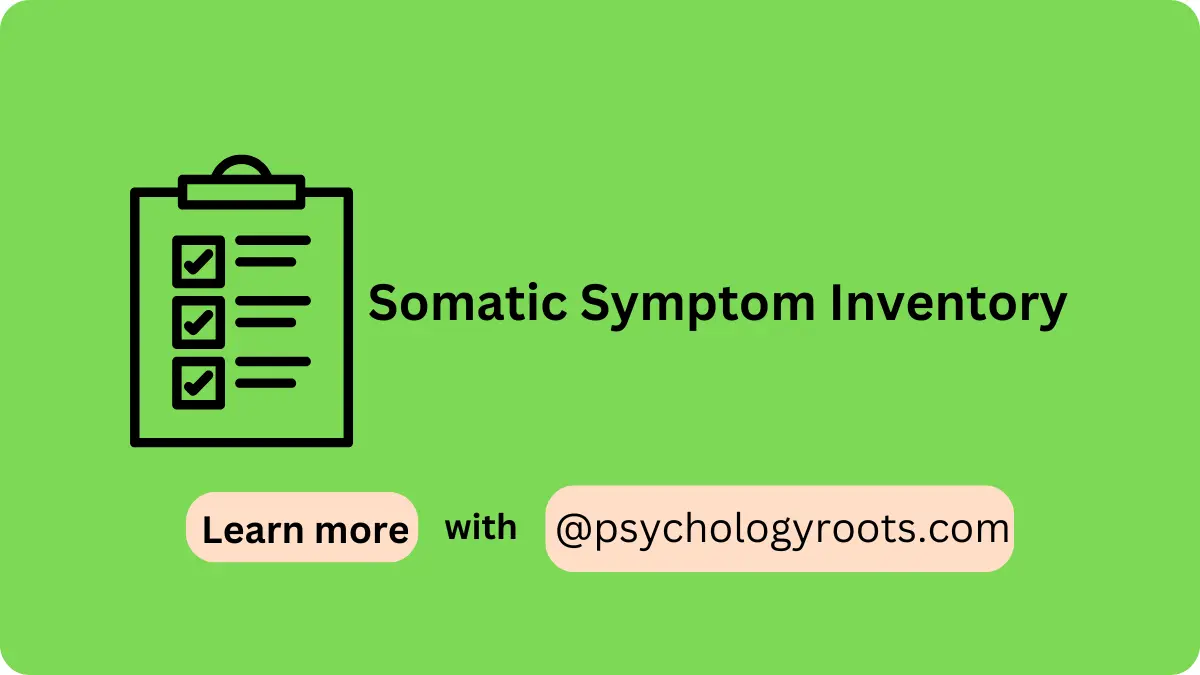Table of Contents
Somatic Symptom Inventory
Here in this post, we are sharing the “Somatic Symptom Inventory”. You can read psychometric and Author information. We have thousands of Scales and questionnaires in our collection (See Scales and Questionnaires). You can demand us any scale and questionnaires related to psychology through our community, and we will provide you with a short time. Keep visiting Psychology Roots.
About Somatic Symptom Inventory
Scale Name
Somatic Symptom Inventory
Author Details
Arthur J. Barsky, Grace Wyshak, and Gerald L. Klerman
Translation Availability
English

Background/Description
The Somatic Symptom Inventory (SSI) is a self-report questionnaire designed to assess the presence and severity of somatic complaints, particularly in the context of hypochondriasis and somatoform disorders. Developed in 1986 by Arthur J. Barsky, Grace Wyshak, and Gerald L. Klerman, the SSI was created to evaluate DSM-III criteria for hypochondriasis in medical outpatients, focusing on the preoccupation with physical symptoms disproportionate to medical findings. Its development responded to the need for a standardized tool to quantify somatic symptoms and their psychological impact, aiding in the differentiation of hypochondriasis from other psychiatric and medical conditions.
The SSI consists of 26 items, drawn from two established scales: the Hypochondriasis scale of the Minnesota Multiphasic Personality Inventory (MMPI) and the Hopkins Symptom Checklist (HSCL) Somatization scale. Respondents rate the frequency or intensity of physical symptoms (e.g., headaches, chest pain, fatigue) over a specified period, typically the past week, on a scale that varies by version but often uses a 5-point Likert scale (1 = “not at all” to 5 = “extremely”). Total scores range from 26 to 130, with higher scores indicating greater somatic preoccupation. Its validation in medical and psychiatric populations ensures its relevance for identifying excessive health anxiety and somatoform presentations.
Psychologists and clinicians value the SSI for its ability to capture the subjective experience of somatic symptoms, which is critical for diagnosing conditions like somatic symptom disorder or illness anxiety disorder in DSM-5. It supports screening, differential diagnosis, and treatment planning for interventions like cognitive-behavioral therapy (CBT) or mindfulness-based approaches. The scale’s translations enhance its applicability, allowing professionals to address somatic concerns across diverse populations with precision and sensitivity.
Administration, Scoring and Interpretation
- Obtain a copy of the Somatic Symptom Inventory from a reputable source, such as peer-reviewed journals or authorized psychological research platforms, ensuring proper use permissions.
- Explain the purpose of the SSI to the respondent, noting that it assesses physical symptoms and their impact to guide clinical care or research, emphasizing confidentiality.
- Provide instructions, asking the respondent to rate each of the 26 symptoms based on their frequency or intensity over the past week, using the designated scale (typically 1-5).
- Approximate time for completion is about 5-10 minutes, depending on the respondent’s pace and comprehension.
- Administer the scale in a private, comfortable setting, using paper or digital formats, to promote honest and accurate responses.
Reliability and Validity
The Somatic Symptom Inventory exhibits robust psychometric properties, supporting its use in clinical and research contexts. Internal consistency is high, with Cronbach’s alpha values ranging from 0.85 to 0.90, indicating strong cohesion across its 26 items. Test-retest reliability is satisfactory, with correlations of 0.80-0.85 over short intervals in stable populations, reflecting consistent measurement of somatic complaints.
Convergent validity is evidenced by strong correlations with other somatization measures, such as the Patient Health Questionnaire-15 (PHQ-15) (r = 0.65-0.75) and the HSCL Somatization scale (r = 0.70-0.80). Discriminant validity is supported by weaker associations with unrelated constructs, like cognitive anxiety (r < 0.40), though some overlap with depression exists due to shared somatic features (r = 0.45-0.55). Criterion validity is demonstrated by its ability to differentiate patients with hypochondriasis from those with other psychiatric or medical conditions and its sensitivity to treatment effects, such as reduced scores post-CBT. These qualities, as reported by Barsky et al. (1986), affirm the SSI’s reliability and validity.
Available Versions
26-Items
Reference
Barsky, A. J., Wyshak, G., & Klerman, G. L. (1986). Hypochondriasis: an evaluation of the DSM-III criteria in medical outpatients. Archives of General Psychiatry, 43(5), 493-500.
Important Link
Scale File:
Frequently Asked Questions
What does the SSI measure?
It measures the frequency and intensity of somatic symptoms in hypochondriasis or somatoform disorders.
Who can use the SSI?
Clinicians, psychologists, and researchers assessing somatic complaints.
How long does the SSI take to complete?
It takes about 5-10 minutes.
Is the SSI specific to hypochondriasis?
No, it’s used for various somatoform and health anxiety conditions.
Can the SSI track treatment outcomes?
Yes, it’s sensitive to changes from therapies like CBT.
Disclaimer
Please note that Psychology Roots does not have the right to grant permission for the use of any psychological scales or assessments listed on its website. To use any scale or assessment, you must obtain permission directly from the author or translator of the tool. Psychology Roots provides information about various tools and their administration procedures, but it is your responsibility to obtain proper permissions before using any scale or assessment. If you need further information about an author’s contact details, please submit a query to the Psychology Roots team.
Help Us Improve This Article
Have you discovered an inaccuracy? We put out great effort to give accurate and scientifically trustworthy information to our readers. Please notify us if you discover any typographical or grammatical errors.
Make a comment. We acknowledge and appreciate your efforts.
Share With Us
If you have any scale or any material related to psychology kindly share it with us at psychologyroots@gmail.com. We help others on behalf of you.